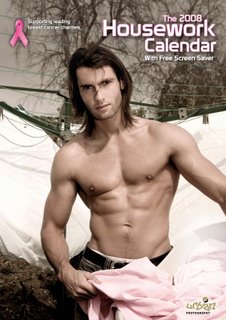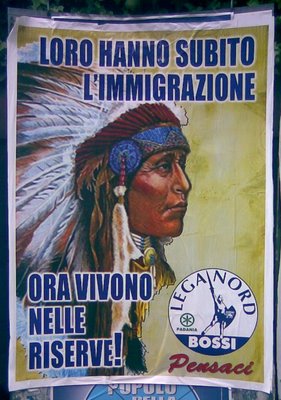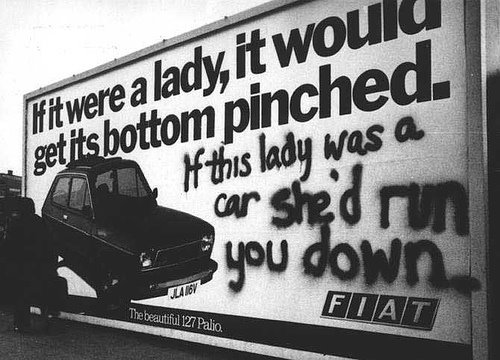I found this ad for an umbilical cord blood storage company in the April 2008 issue of Healthy Las Vegas.
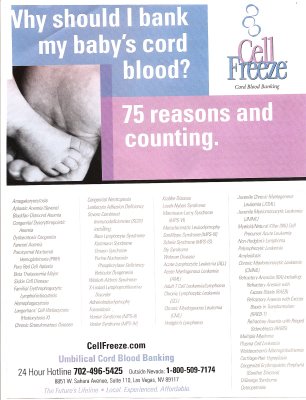
It provides a list of all kinds of very scary-sounding diseases as reasons you should pay to store your baby’s blood cord. It’s another example of scaring parents into buying expensive products to protect their kids–and, obviously, if you won’t spend the money to store your baby’s umbilical cord blood for years, you aren’t a very good parent.
I went to the company’s website. Under the heading “You Only Get One Chance to Bank Cord Blood” it says:
Banking a baby’s cord blood could prove invaluable should you ever need it. You only have one chance to collect this vital fluid and minutes after your baby is born. This sample has the potential to not only help the baby in the future, but also to blood relatives such as parents and siblings. It offers a powerful medical resource in fighting devastating chronic and acute diseases. Think of it as an investment in your family’s future.
It costs $1,850 for the kit to collect the blood from a single birth, plus $95 a year, or $1600 for 18 years, to store it.
Just for fun I looked up the prevalence of some of the diseases listed in the ad. Lesch-Nyhan Syndrome occurs in about 1 out of every 380,000 people. For amyloidosis, it’s about 1 in 100,000. Less than 1 in 200,000 people have Wolman disease (these are all NIH estimates).
To put this in perspective, according to some calculations, a male African American child has about a 1 in 20 lifetime chance of being killed by gunfire. I don’t know what it is for white kids, but I bet that, risk-wise, you’d be better off buying your kid a bullet-proof vest than banking their cord blood.
CBS Sunday Morning had a segment on the new-ish phenomenon of “Maid Cafés.” I gathered from the report that they are most popular in areas of Japan where there are a lot of (male) “geeks.” Here’s a description from a Boston.com article on these restaurants:
“Welcome home, Master,” says the maid as she bows deeply, hands clasped in front of a starched pinafore worn over a short pink dress.
This maid serves not some aristocrat but a string of pop-culture-mad customers at a “Maid Cafe” in Tokyo’s Akihabara district, long known as a Mecca for electronics buffs but now also the center of the capital’s “nerd culture.”
“When they address you as ‘Master’, the feeling you get is like a high,” says Koji Abei, a 20-year-old student having coffee with a friend at the Royal Milk Cafe and Aromacare.
Here’s a wikipedia description— discussing how these cafés pull various cultural practices– Japanese manga, anime, Japanese geishas, and French (or English) maids. Apparently, there are now Maid Cafés in Canada and Hong Kong (the one in Hong Kong is called the “Master-and-maid café”). Here are some videos as well– from the U.S. news, and from Japanese news (sorry it isn’t translated). These might make for an interesting discussion on culture, globalization, and gender.
[youtube]http://www.youtube.com/watch?v=PjNGX-jQS94[/youtube]
[youtube]http://www.youtube.com/watch?v=c0JmfyP4KPs[/youtube]
In this commercial a cadre of communist icons are gathered in a delapidated estate. Fidel Castro approaches Karl Marx and Che Guevara. Che says: “It’s time for a new revolution.” Karl says: “It’s about what people need.”
And the last line, according to googe translation German-English, says: “The first estate, which everyone can afford.”
A great example of something we’d NEVER see in the U.S.
Found here. Thanks to Miguel for the image and the translation!
Lisa Wade, PhD is an Associate Professor at Tulane University. She is the author of American Hookup, a book about college sexual culture; a textbook about gender; and a forthcoming introductory text: Terrible Magnificent Sociology. You can follow her on Twitter and Instagram.
Marcello sent us this really fascinating example of political propaganda from an anti-immigrant party in Italy. He translated the text as:
They suffered immigration
Now they live in reserves
Think about it
The implication is, if they let immigrants into Italy, the current residents will suffer the same fate as American Indians.
Beside the obvious racist concept i think it’s quite ironic that they identify
themselves with people they would probably discriminate [against] if they ever
met any american-native people here in italy and the fact that they criminalize
the role that the very same “western civilization” they stand for (against the
“bastardization of culture from muslim heretics”, their words, not mine) played
in the american-native genocide.
Original post, by Marcello, here. Thanks!
.
Toothpaste and tampons designed with your skin color “in mind.” MultiCult Classics says:
OK, Pantene offers products designed with Black women in mind. But Crest, Always and Tampax?
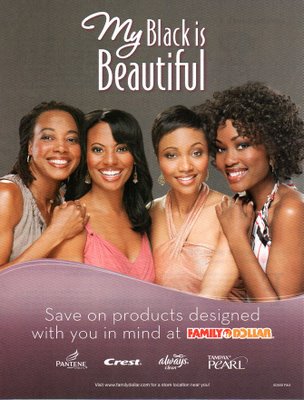 Also, apparently the black that is beautiful is light-skinned, with supposedly “European” facial features. See also: black models that don’t look black.
Also, apparently the black that is beautiful is light-skinned, with supposedly “European” facial features. See also: black models that don’t look black.
UPDATE: In the comments, Brian asked what I mean by “reification.” Thanks for the question, Brian! I mean “treating an abstraction as if it were real.” And, yep, race isn’t real. See racial categories as a historical artifact and check out this great website by the American Anthropological Association.
As I re-read… the contradiction between the two last paragraphs (black models that look white and there’s no such thing as black and white) is awesomely reflective of the reality of its race and its simultaneous non-reality!
.
This ad for Star Wars on Spike TV suggests that Darth Vader turned evil because he was called a girl’s name as a kid. After all, what could be more insulting than that? (His name, before he was Darth Vader, was Anakin Skywalker.)
Thanks Craig S.! Craig saw the ad in the New York City subway.
Also in men must avoid femininity at all costs: eat like a man, I have to act so masculine, denigration with feminity, and my wife makes more money (the shame).
.

